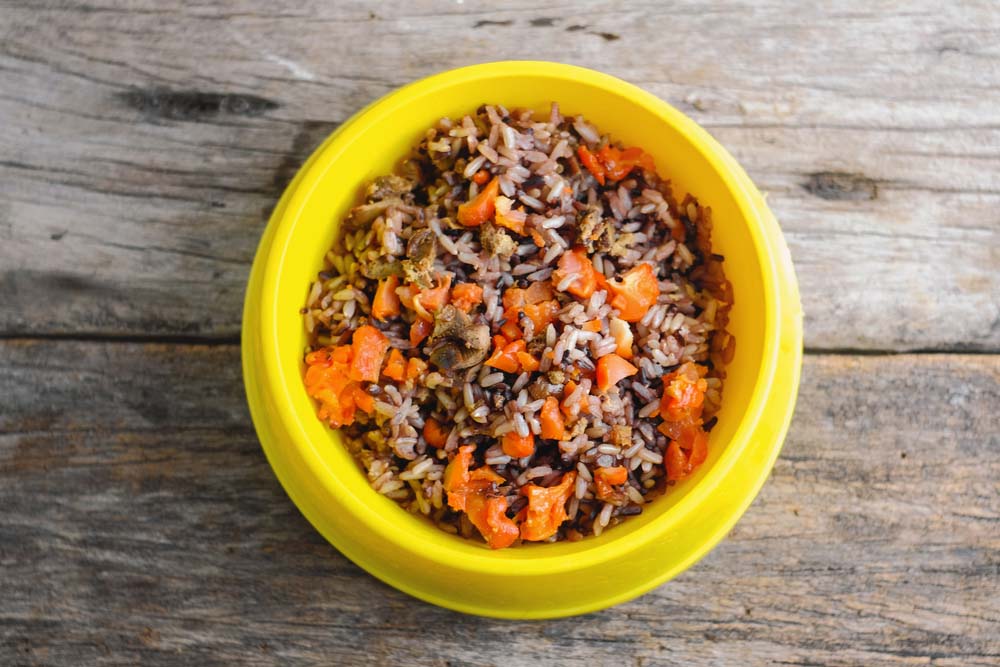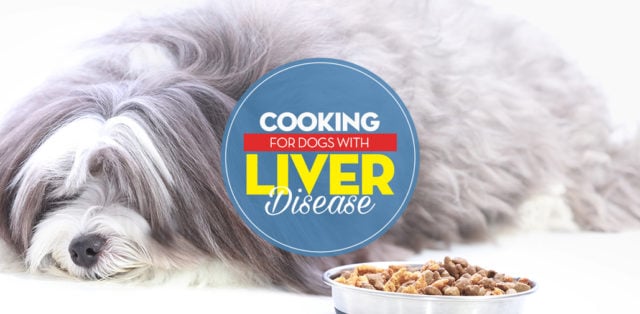
Table of Contents
- What is a Liver Disease in Dogs?
- Different Types of Liver Disease
- Signs of Liver Disease in Dogs
- How to Feed Dogs With Liver Disease
- Structuring Your Dog’s Liver Disease Diet
- Homemade Meal to Feed Dogs with Liver Disease
- FAQs About How to Feed Dogs With Liver Disease
- How to Feed Dogs with Liver Disease: Before You Go…
Unfortunately, liver disease in dogs is a common occurrence.
But fret not, there are proper ways to feed dogs with liver disease.
Your veterinarian will help you develop an evidence-based plan to reduce the symptoms, which will likely involve tests, medication, and diet.
So, in this article, I'll discuss the specific dietary changes you can make for your dog with liver disease.
This is a comprehensive guide, so be sure not to miss out on the following vital topics:
- What liver disease is all about
- Types and symptoms of liver disease in dogs
- How to feed your dogs with liver disease
- What foods to include and avoid in your dog's diet
- Homemade recipe for dogs with liver disease
What is a Liver Disease in Dogs?
The liver is an important organ in a dog’s body.
It acts as a cleaning system — removing toxins and waste. Plus, it produces bile for better digestion.
But when a dog's liver is compromised, the build-up of toxins and waste can affect other organs causing serious health issues.
Causes of liver disease in dogs can be the following:
- Aging
- Genes
- Injuries
- Poor diet
It can also result from some infection or trauma in that area, as well as other diseases affecting the liver or even medications.
Some breeds, like Doberman Pinschers and West Highland Terriers, are at higher risk of liver disease.
And according to experts:
“Matings between dogs with high liver copper concentration produced pups with high liver concentration. The copper storage defect is inherited.”
When you're adopting pups, it's vital to ask the breeder or animal shelter for a medical history or parent records, if any.
If you suspect your dog suffers from liver disease, take him to your vet immediately.
Early detection can help treat the problem.
Interestingly, the liver can regenerate itself, which can lead to complete recovery.
Of course, given the right treatment and a proper diet for dogs with liver disease.
Different Types of Liver Disease
Canine liver disease or CLD is a general term that branches out into different categories, such as the following:
- Cancer
- Chronic Hepatitis
- Acute Liver Failure
- Portosystemic shunting
Cancer
Cancer is sad, no matter how you put it.
That's because dogs can develop either direct liver tumors OR cancer that starts somewhere else in the body and spreads to the liver.
If your dog has liver cancer now, it's most likely from what's common in canines like:
- Thyroid
- Lymphoma
- Osteosarcoma
- Mast cell tumors
- Pancreatic cancers
As cancer develops, it travels throughout the body and makes its way into the liver.
Portosystemic Shunting
A long word for a genetic or congenital liver issue, also known as PSS.
Normally, your dog has a vein that connects the organs in its abdomen to the liver.
As they eat, nutrients make their way through the intestines and eventually through the liver.
This is how they process nutrients and filter out any toxins so none of the toxins enter the bloodstream.
Well, with PSS, the unfiltered blood supply that's carrying the nutrients skips past the liver, and the unfiltered blood flows right into the bloodstream.
That blood is then brought into your dog's heart and pumped back out into the rest of the body.
Sounds bad right?
It is, as this starts to show symptoms with neurological issues, which we will go through in a bit.
Fortunately, this can be managed and treated through surgical intervention (if it's a certain type) or medication.
Acute Liver Failure
ALF and Chronic Hepatitis are kind of in the same vein.
Acute liver failure in dogs is usually brought on as a secondary symptom from any of the following scenarios:
- Cancer
- Diabetes
- Infection
- Liver cysts
- Overheating
- Drug-induced
- Chronic hepatitis
- Pancreatic and thyroid diseases
- Poisoning from toxic substances
I should note that Acute Liver Failure can ultimately cause Chronic Hepatitis.
Chronic Hepatitis
This type of hepatitis is the most common disease that can happen to your pup.
It can be caused by infections from bacteria, also known as leptospirosis.
Leptospirosis
Lepto usually infects your dog through urinary contact.
This can be a scary infection because you, as a dog owner, are also at risk.
Yes, you read that right. YOU can get lepto, too.
Copper Associated Hepatitis
This one is interesting.
Dogs need copper in their diet, but like with anything too much of anything can sneak up on your dog and cause serious issues.
Hence where this comes in.
It basically means that the total amount of copper your dog gets from their diet is too high and wreaks havoc on their liver.
So much so that your dog's liver stops helping out with digestion and stops properly filtering out other toxins.
Not good.
Fortunately, your dog can be treated with medication to combat this form of hepatitis.
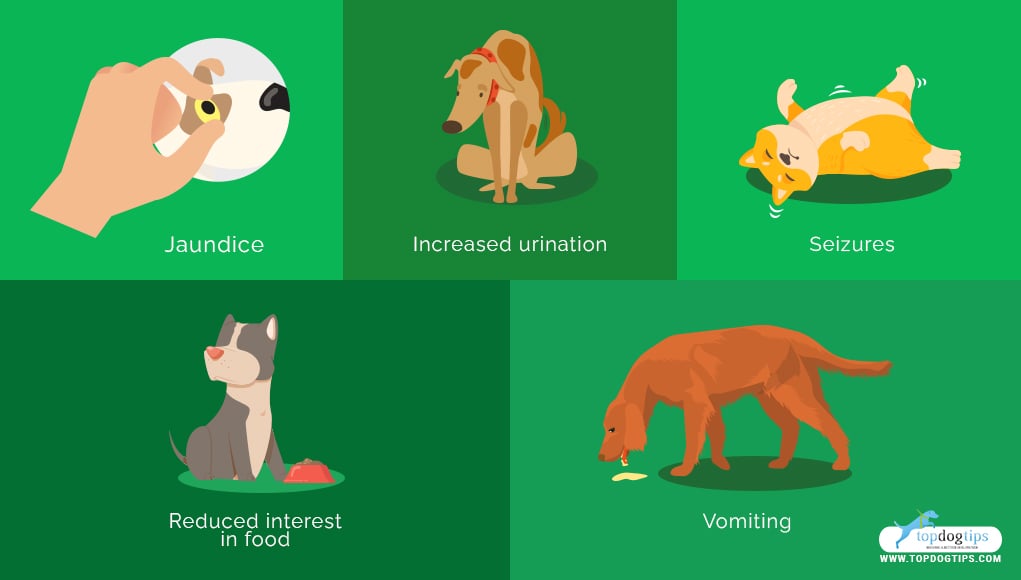
Signs of Liver Disease in Dogs
The following are the common symptoms of liver disease in dogs:
- Jaundice
- Vomiting
- Seizures
- Increased urination
- Reduced interest in food
Take your dog to the vet if you notice any of these symptoms.
How to Feed Dogs With Liver Disease
Since the causes of liver disease vary, the ways you would deal with this problem can be different.
Developing a plan with your vet is crucial based on the causes of liver disease, but knowing how to feed dogs with liver disease can certainly help your dog.
Dietary Guidelines
If you make any changes to their diet, do it SLOWLY AND GRADUALLY.
If you do it fast, you risk damaging your dog’s stomach, making him feel worse than before.
Talk with your vet to determine how to incorporate these changes.
You'll want to feed your dog several times every day, not just one or two meals.
For best results, stick to smaller meals and feed him 4-5 times daily.
- It's easier on his stomach.
- It decreases the amount of nutrition the liver processes in one sitting vs. less frequent larger meals.
Certain holistic vets may even recommend avoiding commercial dog food brands altogether.
Certain brands have low-quality proteins, grains, and starches that may negatively affect the liver.
There is no clear evidence to prove one way or another at the moment, but certain dog food brands may be better than others.
You can also make your own homemade dog food for liver disease (there's good stuff in there on specific DIY dietary guidelines).
Disclaimer: All of Samantha's recipes have been evaluated by a nutritionist prior to putting them on the Internet.
Some people choose to feed their dogs raw diets even though raw feeding is still a highly debated topic.
Practicing safe raw feeding principles can be healthier and easier for the dog's liver than many commercial dog food brands, particularly the cheap non-prescription formulas.
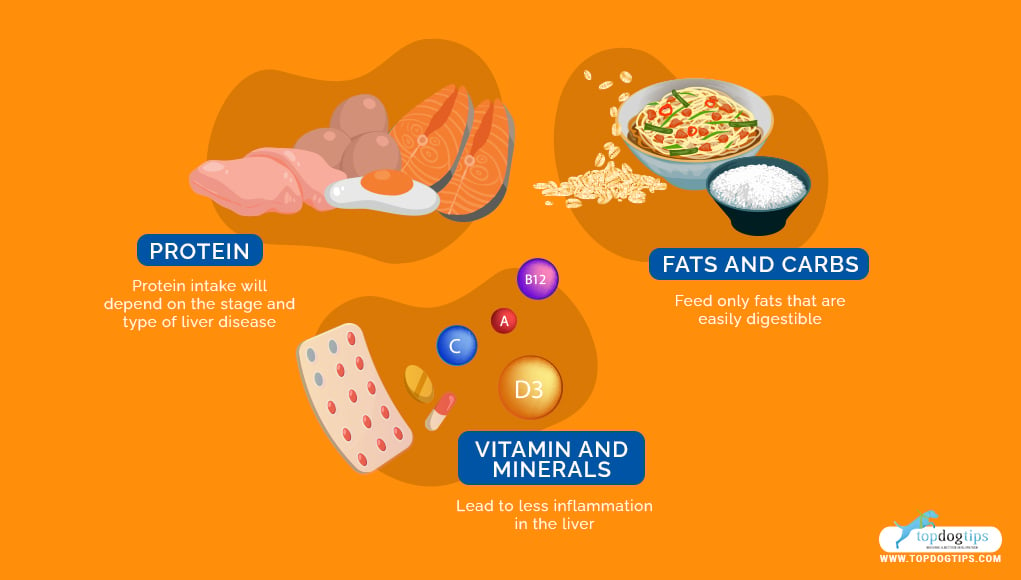
Important Nutrients
Before I get into the nutrients, I want you to know that some nutrients are more important than others for dogs with liver disease.
Protein
The optimal protein intake will vary depending on the stage and type of liver disease.
Some types of liver disease will demand a protein increase, while other types or stages might require limiting protein.
Regardless, remember to feed your dog the right type of high-quality protein for liver health.
For example, according to Dr. Heinz in an interview, “certain types of protein cause more problems than others.”
He then goes on to say that organ meats and fish can actually hurt your dog if they have liver disease.
All the while, plant-based and egg protein seems to be much easier for their bodies to process and absorb.
In fact, your vet will recommend the type of protein and how much to feed them based on the following:
- How bad their liver disease is
- What medical conditions are causing the liver disease
- What are the current medications the dog is taking
High Copper Foods
Some animal proteins are high in copper, which is not good for liver disease. These should be avoided, especially organ meat like liver.
Also, avoid salmon, red meats, organ meats, and duck since they are all rich in copper, and go with chicken, turkey, beef, and white fish instead.
RELATED: The Best Low Protein Dog Food for Kidney and Liver Health
Fats and Carbs
Again, depending on the case, some dogs with liver disease can tolerate higher fat levels in their diet, while you should keep others at a moderate fat intake.
Fat is essential for energy and calories, but it can cause distress to dogs with liver disease since it is processed through the liver.
Therefore, it is best to feed only easily digestible fats, like fish oil and flaxseed oil.
On the other hand, carbohydrates are important in all cases because they can help aid your dog’s digestion since they are rich in fiber.
They also help remove ammonia from your canine’s system. Add white rice, oatmeal, or pasta to your dog’s diet.
Vitamin and Minerals
It is important to include vitamins like vitamin E, vitamin C, vitamin K, and vitamin B complex, and minerals like zinc.
Vitamin C is good for its antioxidant properties, just like vitamin E, which is great for liver health. They can lead to less inflammation in the liver, among other things.
Vitamin K can help with blood clotting and assist your dog’s body in coping with the byproducts of changed liver metabolism.
Zinc is good for binding copper and also has antioxidant properties that help the liver function properly.
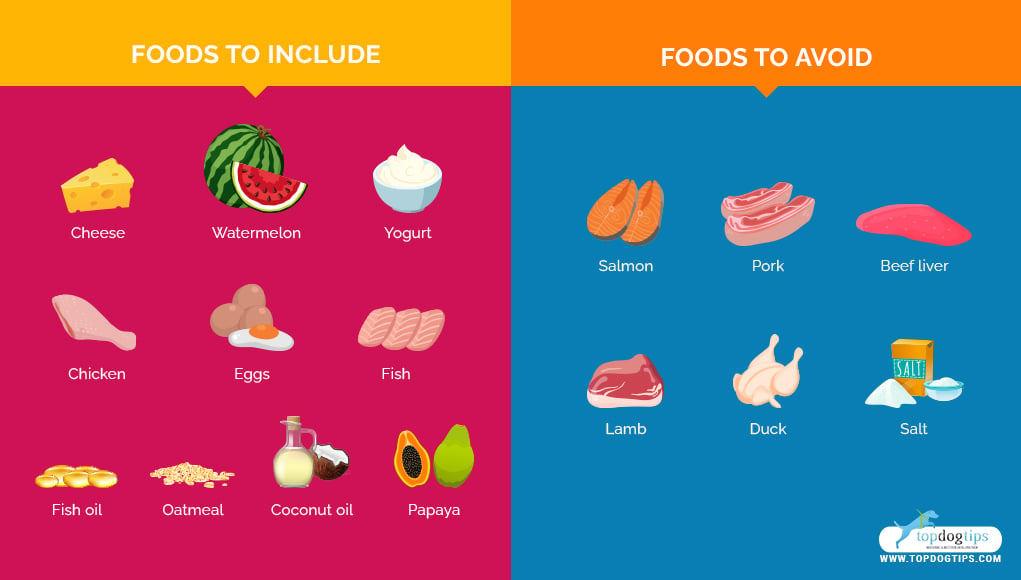
Structuring Your Dog’s Liver Disease Diet
As we mentioned before, please consult with your vet before you add any ingredients to your dog’s diet, and make sure to feed him at least four times a day.
Foods to Include
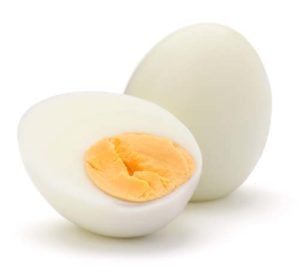 Add safe dairy products to your dog’s diet, like ricotta cheese, cottage cheese, and yogurt.
Add safe dairy products to your dog’s diet, like ricotta cheese, cottage cheese, and yogurt.
These foods will help his digestion and will also produce less ammonia than meat.
Just make sure you stick to dairy products that are low in salt and fat, and keep in mind that goat cheese is easier to digest than cow cheese.
Eggs are a great source of protein for your dog, and you should include them in your diet. Other protein sources you can include are fish and skinless and boneless turkey or chicken.
These foods are high-quality proteins that are good for your dog’s liver.
RELATED: Recipe: Egg-Based Food for Dogs with Liver Disease
Oatmeal is great for liver disease.
After all, it contains soluble fiber that can help remove ammonia from your dog’s system, which is good for the liver because it doesn’t have to process it then.
Boiled white rice is also something you should include in his diet because of soluble fiber and barley and canned pumpkin.
Add a little bit of fish oil or salmon oil to your dog’s meals because they are rich in omega-3 fatty acids, and they can help reduce inflammation within the liver.
There is also a possibility that some fruits like watermelon, fig, and papaya can protect the liver, so try to include them in your dog’s diet.
However, if you want to feed your dog watermelon, try to take out all the seeds because they can cause intestinal blockage.
Also, please don’t give your dog more than a few figs because they can cause stomach upset.
Coconut, and especially coconut oil, can be good for your dog’s liver. Coconut oil is perfect if your dog has trouble absorbing fat.
Just add 1 tablespoon of coconut oil daily to your dog’s diet, and use virgin or unrefined coconut oil.
Foods to Avoid
Avoid foods that are high in copper.
Liver disease is sometimes associated with copper build-up, and if that is the case with your dog, you should limit his copper intake.
Most organ meats are high in copper, and you should particularly avoid beef liver. Chicken and turkey liver are fine since they have little copper.
Avoid lamb, duck, pork, and salmon as well.
If you can’t prepare homemade dog food for your pup, ask your vet which prescription diet food would be best for him.
You should closely monitor salt intake because it can contribute to liver disease, particularly retaining extra fluid.
If your dog has a serious liver condition, you should put him on a low-salt diet. That will prevent the build-up of fluid in his abdomen.
Homemade Meal to Feed Dogs with Liver Disease
The best way to make sure that your dog isn’t eating anything that can hurt his liver is to cook for him.
There are many simple and easy recipes you can make quickly.
Try the one I've mentioned below, and you can also try Samantha's liver disease recipe.
Cooked Chicken with Cottage Cheese
This homemade dog food recipe is good for dogs with liver disease. That's because it has high-quality protein in chicken, cheese, and egg.
It's also rich in soluble fiber from oatmeal and pumpkin, which will help his digestion as well. It is also a pretty simple recipe that requires only around 20 minutes of prep time.
Ingredients:
- 3/4 cup of low-fat cottage cheese
- 1/2 cup of cooked chicken
- 1/2 cup of cooked oatmeal
- 1 boiled egg
- 1/2 cup of canned pumpkin
Preparation:
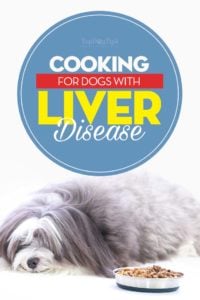 Step 1
Step 1
Cook the chicken. You can use chicken breasts to stick to lean, low-fat meat, but other parts of chicken meat are also fine.
Just make sure that it is boneless and skinless.
Step 2
Dice the chicken meat and then bake it, cook it in a frying pan, or boil it, whatever you prefer.
Step 3
Cook the oatmeal, boil the egg in advance, and mix these ingredients when your chicken is thoroughly cooked.
Step 4
Add cottage cheese and canned pumpkin and mix it all in one large bowl.
As soon as you mix it properly, you can serve this meal to your dog.
You can store leftovers in your fridge for up to 4 days, and if you make a larger batch, you can also freeze it for up to 2 months.
RELATED: Recipe: Easy-to-Make Homemade Dog Food for Liver Disease
FAQs About How to Feed Dogs With Liver Disease
If you don’t need all of the information above, turn to these common questions to learn about a dog’s diet with liver disease.
What Do You Feed a Dog with Liver Problems?
Try to focus on giving your dog liver issues eggs, poultry, and small fish, such as cod, salmon, and sardines. Avoid red meats, as they have high phosphorus levels.
How Can I Help My Dog with Liver Problems?
Start by following the advice that your vet gives you, including following a diet for dogs with liver disease. You may also need to give your dog supplements.
Your vet may suggest other treatments as well, potentially including surgery.
What Foods Are Good for Elevated Liver Enzymes?
Coffee, greens, fish, oatmeal, walnuts, avocado, and tofu are all good foods for elevated liver enzymes.
If you give your dog human food, always ensure that it is safe for canines before doing so.
What Foods Should Be Avoided with Liver Disease?
Dogs with liver disease should avoid foods high in copper or salt, such as lamb, duck, salmon, pork, and liver meats.
Can Dog Food Cause Liver Problems?
Toxic dog food can lead to liver problems. That being said, many dogs who eat tainted or toxic dog food are perfectly healthy.
Your vet can help you determine the cause of your dog’s liver problems as well as the ideal treatment.
How to Feed Dogs with Liver Disease: Before You Go…
Worrying about how to feed dogs with liver disease is a normal feeling, especially for concerned and loving pup parents like you.
Fortunately, our resident experts at Top Dog Tips are looking into this matter seriously.
Dogs with liver disease can live normal lives given that you're paying attention to the nutrition they're consuming.
Once again, we hope this blog helps you and your pup.
Looking for liver disease-related stuff? We got 'em.


